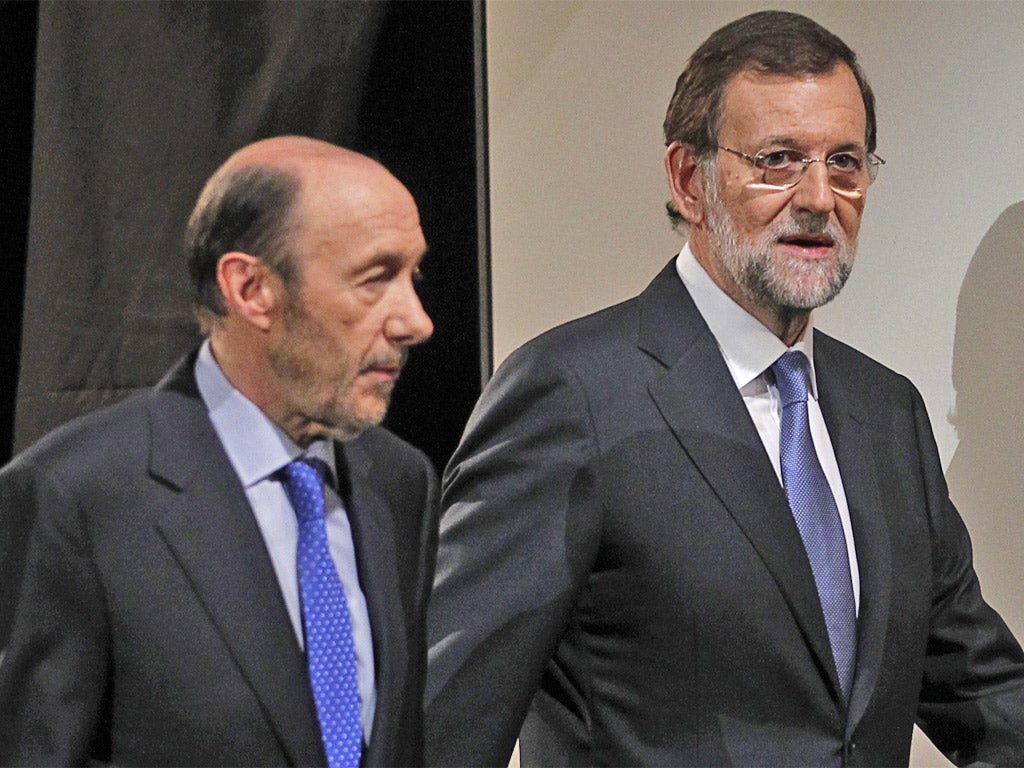Spain's Socialist leader fails to land blow in TV showdown
Victory for right-winger Rajoy in the general election looks assured as he emerges unscathed

They say nothing is certain in politics, but a victory for the front-runner in Spain's upcoming general election, Mariano Rajoy of the right-wing Partido Popular, now looks all but set in stone after he emerged virtually unscathed from a television debate with the leading challenger.
The debate was considered the best opportunity for the Socialist Party's Alfredo Perez Rubalcaba to reverse a remorseless series of unfavourable opinion polls, with an electorate fed up with deteriorating economic conditions and soaring unemployment under the current Socialist Prime Minister, Jose Luis Rodriguez Zapatero.
Held at prime time on Monday night, the widely-anticipated sole one-to-one encounter of the 2011 campaign even had its own countdown on state television's evening news. But in comparison to the racy build-up, the event itself was painfully formulaic. Allotted speech times and a lack of a television audience at hand to ask unpredictable questions all contributed to the leaden atmosphere.
Nor did it help that Mr Rajoy, 56, and Mr Rubalcaba, 60, have been familiar parts of Spain's political furniture for the past two decades. Mr Zapatero, who stormed to an unexpected win in 2004 and was re-elected in 2008, is not standing in the 20 November polls.
Most of the debate was dedicated to the country's beleaguered economy, with Mr Rajoy noting that despite having the same jobless levels as Germany and France when the recession began – 8.2 per cent – Spain now has almost triple that total. Mr Rubalcaba fired back, accusing Mr Rajoy of wanting to increase VAT levels and meddle with unemployment benefits and pensions. But he did little to boost his leadership credentials, with his turn of phrase sometimes suggesting he had tacitly accepted that his rival would be Spain's next premier.
And Mr Rajoy, as befitted a candidate with a 17-point advantage in the opinion polls, did little to dispel that impression, neatly outmanoeuvring Mr Rubalcaba's insinuations that he was in the pocket of big business and dodging challenges to take a definitive position on two potential controversial issues, gay marriage or abortion.
Mr Rubalcaba offered policies as innovative as a Marshall-style plan of public investment for Europe and a delay in meeting deficit target until 2015. However, they were skewered by Mr Rajoy's reminders that Spain's five million unemployed have left the Socialists' credibility of handling the economy at rock bottom.
And despite a bumpy last-minute discussion over potential cutbacks in education, it was a sign of his success that Mr Rajoy barely had to use what could have been his trump card – that until this July, Mr Rubalcaba has been Deputy Prime Minister of a government that has overseen Spain's worst recession in half a century.
Join our commenting forum
Join thought-provoking conversations, follow other Independent readers and see their replies
Comments
Bookmark popover
Removed from bookmarks